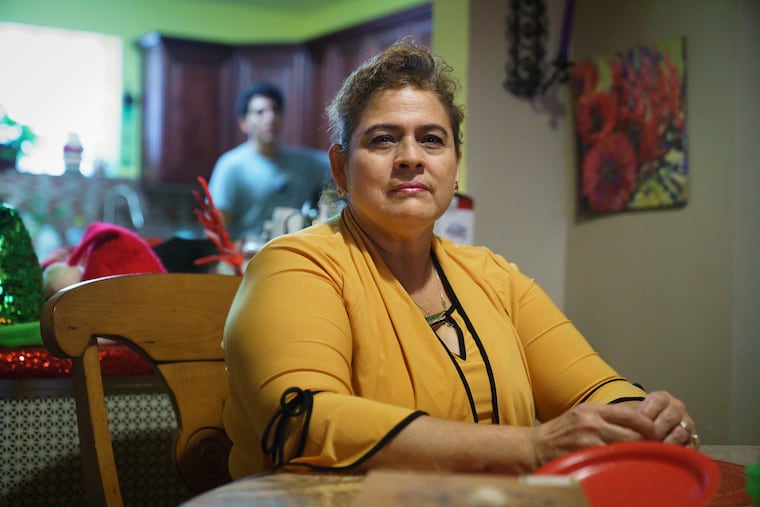A new app gives paid time off to the ‘original gig workers’
Philly house cleaners now have access to the app, developed by the National Domestic Workers Alliance.

>> UPDATE: Here’s how new labor protections for Philly’s domestic workers would be applied
For the first time in her 20-year career cleaning houses in Philadelphia, Maria Del Carmen Diaz will soon be able to take a paid day off.
Diaz, a mother of three in her 50s who left her home and her telecom job near the Gulf of Mexico for the United States in 1996, described it as a welcome benefit in a job that does not have many. No health care, no retirement fund, no contracts — which means that if a client pays her weeks late or cancels last-minute, which they do, she said, she has no recourse.
But paid time off is a step in the right direction, Diaz said in Spanish through an interpreter. And she’s able to get it because of a new app from the National Domestic Workers Alliance (NDWA), called Alia.
Billed as the first “portable benefits” app of its kind — meaning benefits are tied to the worker, not the employer — Alia, which has been in beta testing for most of 2018 but launched to the public in December, allows house cleaners to accrue paid sick days or other kinds of paid time off by collecting a small fee-per-job from clients. The app suggests a $5 contribution per cleaning, with a minimum of $5 a month. Cleaners have to accrue $120 in order to receive the benefit, which comes in the form of a prepaid VISA card. (Alia also allows cleaners to accrue disability, life, and accident insurance, but that feature is live only in California and New York.)
NDWA declined to share user numbers locally and nationally.
‘Domestic work should be protected’
Alia is a response to the “benefits problem” that NDWA, which organizes and advocates for domestic workers such as nannies and caregivers, has been hearing about for years, said Palak Shah, who runs NDWA’s innovation arm, Fair Care Labs. The philosophy behind the app, she said, is that “domestic work should be protected and respected just like all work."
But domestic work has long been left out of worker protection laws, such as the National Labor Relations Act of 1935 and the Fair Labor Standards Act of 1938, as domestic work — often not seen as “real work” — has largely been taken on by marginalized women of color. A growing movement, led by NDWA, has fought to change this: New York state, California, and Seattle have all passed a “Domestic Worker Bill of Rights,” and a similar federal bill was introduced in November.
A Pennsylvania campaign to fight for domestic workers' rights, which Diaz has joined, launched in the fall. In 2016, there were roughly 16,000 domestic workers in the Philadelphia metro area, according to an analysis of census data by Penn professor Pilar Goñalons-Pons, up from 12,000 in 2010. More than half of them were Hispanic or not white and their average annual income was just above $10,000. (Goñalons-Pons tallied the numbers by counting those who reported their main occupation as cleaners, child-care workers, or personal-care aids, and their place of employment as a private household.)
The original ‘gig’ workers
But if Alia is successful, it could reverberate across many industries. NDWA and others who study domestic work like to say that domestic workers were the original “gig” workers, which makes them especially instructive at a time when one in five jobs is held by a worker under contract, and tragedies like the death of bike messenger Pablo Avendano in Philadelphia last year have shined a light on these workers' lack of protections.
“The conditions we’re worried about with the future of work is really what domestic workers have been facing for generations,” Shah said.
Venture capitalists, cofounders, and CEOs of on-demand companies such as Lyft, Handy, and Instacart have called for the development of portable benefits programs. In 2017, Google launched a $50 million fund to, among other things, improve the quality of low-wage work. One of its first grantees was NDWA.
As with any app, adoption is a hurdle. In the case of Alia, cleaners have to ask clients to sign up -- often a difficult ask depending on the relationship between employer and employee. It’s part of the reason only one of Diaz’s clients is signed up -- she said she also barely sees most of her clients.
But Shah says the Alia rollout has shown that employers generally want to help their cleaners get better benefits but don’t know how.
Sharon Pollak, a social worker living in Center City who has employed the same house cleaner for more than a decade, was alerted to Alia by her daughter and then explained the app to her cleaner.
For Pollak, 60, it was a small way that she could support the person who cleans the bedroom and bathroom, what she called “the most intimate spaces of your life.”
It was a “no-brainer,” Pollak said.